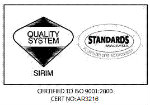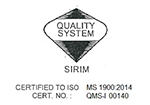Towards A New Democratic Culture
MOVIE critics are usually people who have never made movies. This may be a crude generalisation, but as far as generalisation goes, this impression is generally true.
Critics are everywhere. In fact, someone even said that everyone is a critic. And again, this rings true to a certain extent.
It is quite prevalent that we easily see others’ shortcomings, mistakes and faults. While it is indeed Islamic for us to point out these weaknesses and imperfections, we, in particular Muslims, should at all times observe the adab to do so.
We should ask ourselves the reason as to why we want to point out these deficiencies. Will we gain some mileage by doing so? Will we become more popular?
In this respect, our intention or niat is very important. If we point out mistakes to rectify them, then this is commendable. If we present solutions to these shortcomings and not just simply criticise, it is even more laudable.
It is simple for people to see other people’s flaws and yet, at the same time, forget their own. The Malay proverb that says “kuman di seberang nampak, gajah di hadapan mata tidak” is ironically reflective of the general scenario in our society today–and this is indeed very unfortunate.
This lamentable situation is even more apparent today now that the general election is drawing near. We find politicians quite at ease with these unIslamic acts while they themselves proclaim to be Islamic. This paradox is worrying. Is it right to preach one thing and yet practise the complete opposite?
While democracy presents the opportunity for the freedom of speech, can we simply say anything that we want? Do we have the proofs to back up our claims?
Any orator or debater knows that he or she needs facts that figure to back up anything that is said, and not simply use flowery language or emotional speech that is condemning, degrading and chiding in nature to make up for the lack of facts.
Sadly, this is what is happening in this country. After more than 40 years of independence, we still need to resort to low-blows and character assassinations to gain support, sympathy and ultimately votes. This, in the long run, is not the very least healthy.
To be fair, it is not only the politicians who are at fault. The predicament is a two-way street. We find that supporters as well as those who attend political lectures are themselves more attracted to this so-called “sensationalism politics” compared to a discourse that is more intellectual in nature.
It does not take Sherlock Holmes to deduce that Malaysians generally enjoy people chiding and citing others’ weaknesses, which is probably why we find the culture of warung kopi gossiping–or its 1990s’ equivalent, “coffeehouse gossiping”–quite common. Intellectual politics seem to have no place in Malaysia.
It is imperative that we as Malaysians inculcate a healthier political culture and consequently a more constructive democratic practice. As mentioned earlier, one of the tenets of democracy is “freedom of speech”.
At the same time, “wisdom of speech” is equally essential. These are the constituents for a “new” democratic culture.
Man has been advised by God to use wisdom when arguing for a cause and, at the same time, Islam preaches to its followers to debate in a courteous manner. In verse 125 of Surah Al-Nahl of the Holy Quran, God says to the effect that “and argue with them in ways that are best and most gracious.”
Undeniably, actions speak louder than words. After all, talk is cheap. If one can just talk, criticise, chide and condemn without being able to present a realistic, practical and implementable solution to problems, then it goes without saying that the person is without substance.
It is worth remembering the reminder by God in the Holy Qaran in verse 2 of Surah At-Saff to the effect: “O ye who believe! Why say ye that which ye do not?”There is no denying that the general election is an important facet of democracy. The campaigning period is part and parcel of conducting an election. It is during this period that political parties and party hopefuls explain their policies and plans should they get elected.
Not many political parties and their candidates are able to present their policies to the electorate. They normally resort to hollow, emotional and sensational political lectures which lack clear plans and directions.
All this has to change. A healthier, constructive and pro-active culture should be cultivated. The new generation of Malaysians–those who were born after independence–should take this lead. This generation will inherit our beloved country and therefore the responsibility falls on them.
Character assassinations and sensational politics should never be allowed to be part of our culture. These traits are simply not Islamic and therefore not part of our norms. They are also counter-productive to our community in the long run.
With the advent of the new century, Malaysians should endeavour to cultivate a new democratic culture. This culture should not be against our norms and beliefs. In a nutshell, it should be Islamic.
Politicians, specifically, should adhere to certain adabs such as expressing opinions, differing in opinions, campaigning and the like. When it comes to elections, be they party elections or general elections, the adabs need to be observed at all times by all those concerned.
Money politics–which inherently is bribery–should be done away with. Empty promises should be discarded. Fitnah or wrongful accusations should at all times be kept at bay. Likewise, destructive condemnations should never be practised.
All these negative manifestations of democracy must not be allowed to seep into and be part of our culture, lest we want the very fabric of our society to suffer the consequences.
We should always look back at history to remind ourselves of the repercussions of in-fighting, disunity, political discord and back-stabbing. Look at what happened to the once-mighty empire of Malacca. Jealousy and internal political bickering led to the fall of the “Camelot of The East” to the Portuguese.
This is why the new generation of Malaysians should understand history as well as the current socio-political realities to bring the country to greater heights in the 21 century. This understanding is of utmost importance as the fate of the country lies in the hands of this generation of future leaders and decision makers.
As such, there is indeed a need to cultivate the new culture of democracy. But where and how do we begin?
Perhaps this is where leadership skills among youths take the spotlight. How they conduct themselves in student movements and youth organisations should be looked at. If what they practise in this smaller-scale society is not reflective of the new culture of democracy, then this is where things should be rectified.
The Institute of Islamic Understanding Malaysia (Ikim) for one, is taking the initiative to inculcate a positive, constructive and pro-active culture in organisational practices with special attention given to youth leaders. Ikim will be conducting a three-day seminar in the form of a youth camp in Port Dickson from Dec 5-7 towards achieving this aim.
It is hoped that participants will realise the need to introduce the new culture of democracy in their organisations so that in the future, when they themselves lead the country, they will be leaders who are more than just talkers.
Basically, the ingredient and formula for our nation to continue to develop and prosper is leaders with good character and reliable track records. It is deeds and not promises that matter most at the end of the day.
While it is true that politicians today, when facing the electorate, tend to criticise others when promoting their respective parties, let us hope that they themselves can deliver what they say and promise.
The electorate, on the other hand, should be able to think wisely and rationally when listening to political lectures and following campaigns.
Only then will the electorate be able to exercise their voting rights effectively and appropriately. We should not be clouded by emotions, rhetoric and sentiments. If this happens, then it is feared that we are the ones who will end up regretting the decisions that we make.
Sometimes, the best critics are those outside the circle of the subject of criticism. This may explain why movie critics are those who never make movies.
Using the same logic, political observers (read: critics) may best do their observation from outside the political arena as they will see things from a different point of view.
A movie critic reviews a film in the best interest of cinema-goers. An article like this, meanwhile, should be considered a community service through which we remind each other for a better future.




